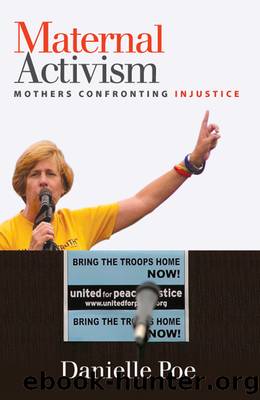Maternal Activism by Danielle Poe

Author:Danielle Poe [Poe, Danielle]
Language: eng
Format: epub
ISBN: 9781438455709
Barnesnoble:
Publisher: State University of New York Press
Published: 2016-01-02T00:00:00+00:00
4
Cindy Sheehan
War and Institutionalized Misinformation
Molly Rushâs and Michele Naar-Obedâs protests focused on the increasing possibility of a nuclear exchange between the U.S. and the former USSR: these mothers focused on bringing attention to the nuclear buildup in the United States; on exposing the ways in which producing nuclear weapons makes all humans vulnerable; and on debunking the myth that building up the military and weapons stockpile protects us. While both Rush and Naar-Obed fear what would happen to their children and children around the world if these weapons are used, Cindy Sheehanâs protests and activism happen because she has had to endure the nightmare of losing her son in war. Sheehanâs protest focuses on the very concrete reality of the harm that comes from war. The harms that they bring to light are actual; they are realized possibilities. As with Rush and Naar-Obed, Sheehan successfully resists U.S. societyâs pressure to stay silent. Although their actions may jeopardize the privileges that they enjoy as white, American women, they reject mainstream approval in order to speak out, act, and make actual and potential suffering visible. They focus attention on the possibility of withdrawing consent and acting nonviolently against a seemingly impenetrable system. Their actions reveal that anyone can act, and in turn their actions reveal that silence in the face of injustice is complicity.
When Casey Sheehan died, his mother began to question U.S. militarism and why U.S. leaders use the military to settle abstract political disputes. Through her protests, others have had the opportunity to question the idea that the very concrete reality of killing and dying produces abstract goods such as freedom and democracy in other countries. Most of the time, white, middle-class people can sit back and declare that something must be done about terrorism without thinking about the people who are killing and being killed in order to supposedly do something. Sheehanâs grief for her son takes away the luxury of ignoring the concrete realities of militarism. The abstract idea of dying for oneâs country is replaced by the concrete reality of a woman mourning her son.
In the summer of 2005, Cindy Sheehan began trying to meet with President George W. Bush to ask him why the United States is waging a war in Iraq, a war that caused the death of her son, Casey. Because Bush resolutely refused to meet with Sheehan, she engaged in protesting outside of his ranch in Texas, followed him as he travelled around the country, and staged a hunger strike in Washington DC. For months, the media was captivated by Sheehanâs persistence. Some observers were moved by the plight of a mother searching for meaning in her sonâs death. Other observers seemed to be outraged by a mother who would demand accountability from the President of the United States. Central to many of the responses are certain beliefs about what mothers ought to do when moved to act politically as mothers.
Sheehanâs quest to ask questions about, and find meaning in, her sonâs death
Download
This site does not store any files on its server. We only index and link to content provided by other sites. Please contact the content providers to delete copyright contents if any and email us, we'll remove relevant links or contents immediately.
On the Front Line with the Women Who Fight Back by Stacey Dooley(4311)
The Lonely City by Olivia Laing(4120)
The Rules Do Not Apply by Ariel Levy(3906)
Bluets by Maggie Nelson(3711)
The Confidence Code by Katty Kay(3566)
Three Women by Lisa Taddeo(2920)
Inferior by Angela Saini(2831)
A Woman Makes a Plan by Maye Musk(2831)
Pledged by Alexandra Robbins(2791)
Not a Diet Book by James Smith(2726)
Confessions of a Video Vixen by Karrine Steffans(2675)
Nice Girls Don't Get the Corner Office by Lois P. Frankel(2594)
Wild Words from Wild Women by Stephens Autumn(2589)
Brave by Rose McGowan(2502)
The Girl in the Spider's Web: A Lisbeth Salander novel, continuing Stieg Larsson's Millennium Series by Lagercrantz David(2381)
The Clitoral Truth: The Secret World at Your Fingertips by Rebecca Chalker(2243)
Why I Am Not a Feminist by Jessa Crispin(2239)
Women & Power by Mary Beard(2225)
Women on Top by Nancy Friday(2122)
